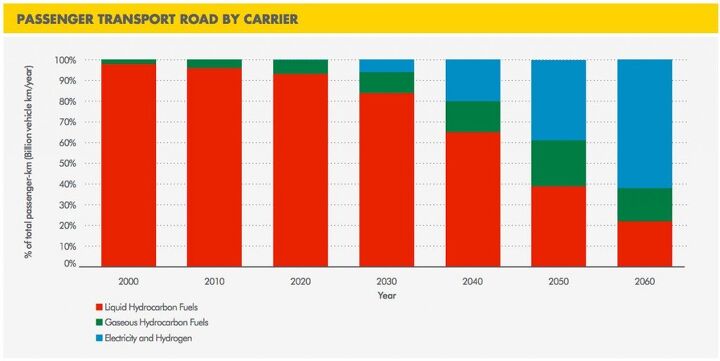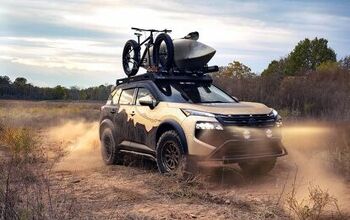Shell Report Sees "Nearly Oil-Free" Transportation by 2070, With Gasoline Replaced by Hydrogen and Electricity
For 40 years the Shell oil company has been putting out reports on what expects in the future. This year’s report titled New Lens Scenarios sees passenger road transportation being “nearly oil-free” by the year 2070. The report is in the plural, scenarios, because the futurists at Shell envision two possible outcomes, which they call “Mountains” and “Oceans”. In both scenarios the world’s population will grow to 9 billion people by 2050 and by 2070 electricity and hydrogen will be the primary means of fueling road transportation.
In the Mountains “lens”, existing governmental and economic power structures are maintained, natural gas will become dominant by the 2030s and demand for liquid fuels will go down. A more urban population will drive much less, about 1,200 miles a year, and use public transport and bicycles more. This lens sees economic growth stagnating and the world failing to meet the target of no more than a 2 degree centigrade rise in average global temperatures.
In the Oceans lens, Shell predicts a changing economic structure to one that is more accommodating of compromise. The world in this more collective scenario would be a more prosperous one, but also more volatile. Dwindling resources of food, energy, and water become the new priorities. Solar and renewable energy becomes more dominant, though fossil fuels will still be used and as with the other scenario, global warming continues.
There’s way too much in the report for a single news blog item, and you’d like, you can read the full PDF file here. A more complete explanation of the nature of the Mountains and Oceans scenarios from the report is below.
Mountains is a world in which those occupying commanding advantage (at the top) generally work to create stability in ways that promote the persistence of the status quo. there is a steady, self-reinforcing, lock-in of incumbent power and institutions. this lock-in constrains the economic potential of some sectors of society, but enables established sectors aligned with market forces to unlock resources that require significant capital and new technology. As for the less fortunate, the thinness of social safety nets is not completely offset by the growth in philanthropy, characterised by an eruption of foundations endowed by increasing numbers of billionaires.
Oceans is a world in which competing interests and the diffusion of influence are met with a rising tide of accommodation. this trajectory is driven by a growing global population with increasing economic empowerment, and a growing recognition by the currently advantaged that their continued success requires compromise. steady reform of economic and financial structures keeps pace with the development of fast-emerging nations and progressively unlocks the productivity of broader sectors in society. But volatility and multiple constituencies impede policy developments in other areas, so tight resources are unlocked primarily by market forces.
More by TTAC Staff
Latest Car Reviews
Read moreLatest Product Reviews
Read moreRecent Comments
- Kwik_Shift_Pro4X Thankfully I don't have to deal with GDI issues in my Frontier. These cleaners should do well for me if I win.
- Theflyersfan Serious answer time...Honda used to stand for excellence in auto engineering. Their first main claim to fame was the CVCC (we don't need a catalytic converter!) engine and it sent from there. Their suspensions, their VTEC engines, slick manual transmissions, even a stowing minivan seat, all theirs. But I think they've been coasting a bit lately. Yes, the Civic Type-R has a powerful small engine, but the Honda of old would have found a way to get more revs out of it and make it feel like an i-VTEC engine of old instead of any old turbo engine that can be found in a multitude of performance small cars. Their 1.5L turbo-4...well...have they ever figured out the oil dilution problems? Very un-Honda-like. Paint issues that still linger. Cheaper feeling interior trim. All things that fly in the face of what Honda once was. The only thing that they seem to have kept have been the sales staff that treat you with utter contempt for daring to walk into their inner sanctum and wanting a deal on something that isn't a bare-bones CR-V. So Honda, beat the rest of your Japanese and Korean rivals, and plug-in hybridize everything. If you want a relatively (in an engineering way) easy way to get ahead of the curve, raise the CAFE score, and have a major point to advertise, and be able to sell to those who can't plug in easily, sell them on something that will get, for example, 35% better mileage, plug in when you get a chance, and drives like a Honda. Bring back some of the engineering skills that Honda once stood for. And then start introducing a portfolio of EVs once people are more comfortable with the idea of plugging in. People seeing that they can easily use an EV for their daily errands with the gas engine never starting will eventually sell them on a future EV because that range anxiety will be lessened. The all EV leap is still a bridge too far, especially as recent sales numbers have shown. Baby steps. That's how you win people over.
- Theflyersfan If this saves (or delays) an expensive carbon brushing off of the valves down the road, I'll take a case. I understand that can be a very expensive bit of scheduled maintenance.
- Zipper69 A Mini should have 2 doors and 4 cylinders and tires the size of dinner plates.All else is puffery.
- Theflyersfan Just in time for the weekend!!! Usual suspects A: All EVs are evil golf carts, spewing nothing but virtue signaling about saving the earth, all the while hacking the limbs off of small kids in Africa, money losing pits of despair that no buyer would ever need and anyone that buys one is a raging moron with no brains and the automakers who make them want to go bankrupt.(Source: all of the comments on every EV article here posted over the years)Usual suspects B: All EVs are powered by unicorns and lollypops with no pollution, drive like dreams, all drivers don't mind stopping for hours on end, eating trays of fast food at every rest stop waiting for charges, save the world by using no gas and batteries are friendly to everyone, bugs included. Everyone should torch their ICE cars now and buy a Tesla or Bolt post haste.(Source: all of the comments on every EV article here posted over the years)Or those in the middle: Maybe one of these days, when the charging infrastructure is better, or there are more options that don't cost as much, one will be considered as part of a rational decision based on driving needs, purchasing costs environmental impact, total cost of ownership, and ease of charging.(Source: many on this site who don't jump on TTAC the split second an EV article appears and lives to trash everyone who is a fan of EVs.)


































Comments
Join the conversation
Coming from an oil company, the only real explanation is we will run out of cheap oil by 2070.
Finally managed to get my browser to enable me to read the report. I was reminded that the prime directive in these exercises is never contradict any dearly held opinions of the company CEO. The current Shell management evidently is relatively pessimistic as to the future of hydraulic fracturing. This is revealed in their analysis of that subject which assumes future tight oil output only from the relative handful of known deposits and using more or less current technology. I'm not surprised. The two European majors, Shell and BP are traditionally the most conservative when it comes to estimating the oil and gas resource base.